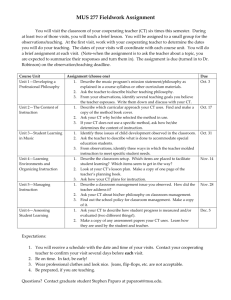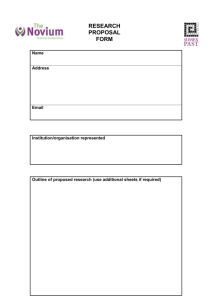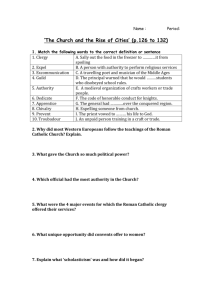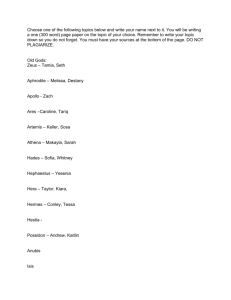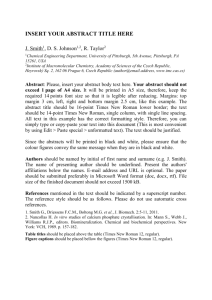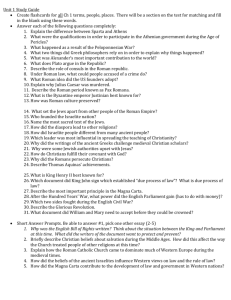ID 11 Civilization: The Human Experience
advertisement
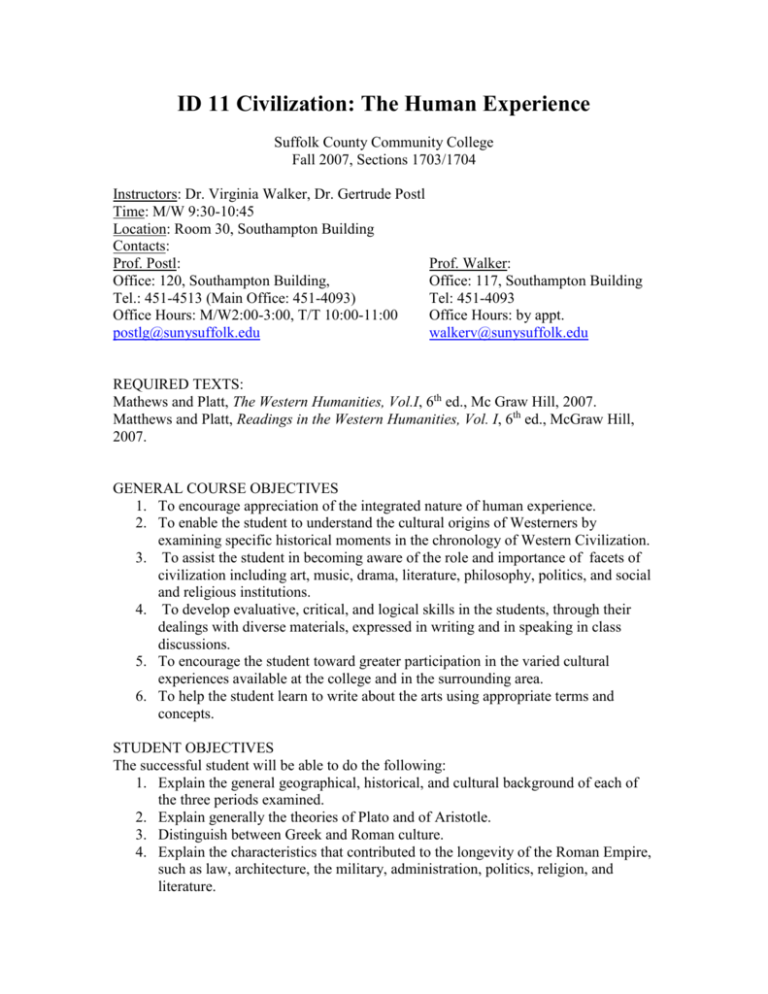
ID 11 Civilization: The Human Experience Suffolk County Community College Fall 2007, Sections 1703/1704 Instructors: Dr. Virginia Walker, Dr. Gertrude Postl Time: M/W 9:30-10:45 Location: Room 30, Southampton Building Contacts: Prof. Postl: Prof. Walker: Office: 120, Southampton Building, Office: 117, Southampton Building Tel.: 451-4513 (Main Office: 451-4093) Tel: 451-4093 Office Hours: M/W2:00-3:00, T/T 10:00-11:00 Office Hours: by appt. postlg@sunysuffolk.edu walkerv@sunysuffolk.edu REQUIRED TEXTS: Mathews and Platt, The Western Humanities, Vol.I, 6th ed., Mc Graw Hill, 2007. Matthews and Platt, Readings in the Western Humanities, Vol. I, 6th ed., McGraw Hill, 2007. GENERAL COURSE OBJECTIVES 1. To encourage appreciation of the integrated nature of human experience. 2. To enable the student to understand the cultural origins of Westerners by examining specific historical moments in the chronology of Western Civilization. 3. To assist the student in becoming aware of the role and importance of facets of civilization including art, music, drama, literature, philosophy, politics, and social and religious institutions. 4. To develop evaluative, critical, and logical skills in the students, through their dealings with diverse materials, expressed in writing and in speaking in class discussions. 5. To encourage the student toward greater participation in the varied cultural experiences available at the college and in the surrounding area. 6. To help the student learn to write about the arts using appropriate terms and concepts. STUDENT OBJECTIVES The successful student will be able to do the following: 1. Explain the general geographical, historical, and cultural background of each of the three periods examined. 2. Explain generally the theories of Plato and of Aristotle. 3. Distinguish between Greek and Roman culture. 4. Explain the characteristics that contributed to the longevity of the Roman Empire, such as law, architecture, the military, administration, politics, religion, and literature. 5. Show the effects of the Church on art, music, literature and politics. 6. Explain the contribution of Charlemagne and the Carolingian era to the development of Western Culture. 7. Identify the factors that led to changes in the social structure of the pre-modern Europe. 8. Explain the dissolution of the medieval Synthesis and the growing emphasis on humanism which led to the Renaissance. 9. Describe the differing values that distinguish the three periods studied. 10. Discern values and assumptions of a culture embodied in the arts. PROCEDURES FOR MEETING THESE OBJECTIVES The instructors will use lectures, class discussions, slides, films, demonstrations, performances, seminars, and cultural excursions. STUDENT REQUIREMENTS FOR COMPLETION OF THE COURSE 1. Read text and other materials by the assigned date. 2. Participate intelligently in class discussions; do not engage in disruptive behavior. 3. Submit papers and other written assignments when due. Late papers will be penalized by a lower grade. 4. Take three exams on the assigned date. N.B.: DO NOT MISS THESE EXAMS. 5. Visit museum and complete questionnaire and essay questions. GRADES—Most probable calculation method: Three Examinations N.B. DO NOT MISS. 45% Each exam will have two parts: a: Literature/Art (will be in two sections) Prof. Walker b: Philosophy/History Prof. Postl Papers: Either two short papers (15% plus 15%) or one longer paper which involves all course aspects (30%); Museum Visit and Assignment 20% Class Participation up to 5% Paper Due dates to be announced. All Papers MUST Be Typed POLICY ON ABSENCE AND LATENESS In accordance with College Policy, the student may be dropped after the third absence. Three lates will count as one absence. Any make ups must be pre approved and will only be given on one assigned date within one week of the exam. Make ups may be more difficult than missed exam. PLAGIARISM “In writing, students must fully acknowledge the source of any paraphrased passages and any ideas which they have borrowed. Failure to conform to these academic standards is plagiarism and may result in a failing grade for the course and/or serious disciplinary sanctions as outlined in the Code of Conduct” (SCCC Catalog, p.69). Plagiarism of any kind will result in a “0” for the assignment in question and in repeated cases in an “F” for the course. Severe cases will be reported to the Dean of Students Office. WEEKLY LECTURES AND GENERAL OUTLINE OF TOPICS Any changes will be announced or distributed. Please pay attention to the professors’ weekly and daily reading assignments in both main text and readings text. In general, for Prof. Walker always read the literature and art sections and study all art illustrations in relevant chapters. Exam dates are listed. Do not miss them! Paper assignments and exact due dates will be announced and distributed. Weeks Dates Topics GREEK PERIOD I Aug 27, 29 Orientation Early Greek History (pp.35-46); II Sept. 5, 10 from Mythology to Philosophy; the Pre-Socratics; Film: Greek Fire; III Sept. 12, 17 Literature -- excerpts: Homer: Iliad & Odyssey, Sappho; Archaic Art (also film), continued lit; IV Sept 19, 24 Hellenic and Hellenistic Greek History (pp.63-68; 93-95); Philosophy: Plato, The Republic (Cave Allegory), Phaedo; Aristotle, Politics; V Sept. 26, Oct.1 Philosophy cont. Classical Art (also film); VI Oct. 3 Greek Theatre: Oedipus, Aristotle, Poetics; Review; VII. Oct 8 Exam ROMAN PERIOD VII Oct. 10 Roman History (pp.119-129) VIII Oct, 15, 17 Philosophy: Epicurus, Marcus Aurelius (Stoicism); Roman Art (also film); Mythology; IX Oct 22, 24 Roman Literature: Cicero, Vergil, Horace, Ovid, Juvenal; Roman Art Late (also film); X Oct. 29, 31, Late Roman History and Early Christianity (pp.183 -188,198-208); Early Christian Literature and Philosophy: New Testament, Eusebius; St. Augustine, The City of God, Confessions; Review; Note Well: Paper may be due. Final Date to be announced. XI Nov. 5 Exam MEDIEVAL PERIOD XI Nov 7 Early Medieval History (pp.208-211); XII Nov 14,19 Literature/ Romanesque Art (also film); Anna Comnena, Boethius, Einhard, Song of Roland; XIII Nov 26, 28 High and Late Medieval History (pp. 247-259, 285-293); Gothic Art (also film) Note Well: Paper May Be Due. Final Date to be announced. XIV Dec 3, 5 Literature: de Troyes, de France, Dante, Petrarch; Philosophy: St. Thomas Aquinas, Summa Theologica; Note Well: Walker Museum Project Paper due. XV Dec. 10, 12 Late Medieval Literature: Chaucer, de Pizan; Foundations for the Renaissance; Review; XV Dec 17 Exam (Make-Up Day if necessary) October 29, Last Day for Mid semester Withdrawal to get W The above suggested readings in literature are subject to change. Please pay attention to the assigned readings from the Reader given in class. Please pay attention to the Text reading assignments when they are given in class. Some of the above lectures may not be in perfect sequence historically. Please refer to text timelines for dating sequences.
